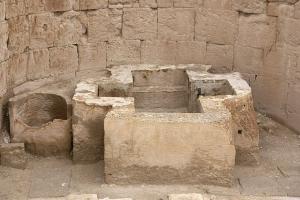“Please Hit ‘Subscribe’”! If you have received benefit from this or any of my other 4,600+ articles, please follow this blog by signing up (with your email address) on the sidebar to the right (you may have to scroll down a bit), above where there is an icon bar, “Sign Me Up!”: to receive notice when I post a new blog article. This is the equivalent of subscribing to a YouTube channel. Please also consider following me on Twitter / X and purchasing one or more of my 55 books. All of this helps me get more exposure, and (however little!) more income for my full-time apologetics work. Thanks so much and happy reading!
***
Anti-Catholic Protestant apologist Jason Engwer of Tribalblog fame really outdid himself this time. He has come up with some real whoppers in his long writing career but this one (“The Day Of Salvation Is Several Months From Now”: 5-26-24) may take the cake. His words will be in blue.
baptismal regeneration interferes with the Biblical theme of the nearness of redemption.
Really? Funny, I never noticed that. I fail to see how something that the Bible repeatedly and undeniably connects to redemption and salvation can somehow “interfere” with redemption.
The title of this post is meant to draw attention to the contrast between the Biblical theme of the nearness of redemption, such as the reference to how “now is ‘the day of salvation'” in 2 Corinthians 6:2, and the absurd putting of off redemption under baptismal regeneration.
Some in the early Church did indeed postpone baptism (sometimes till near death), but that is long gone. The Church from early times started routinely baptizing infants, and putting off baptism is not a biblical theme, either. It was merely an unfortunate tradition of men.
Jason points out a supposed “inconsistency between baptismal regeneration and how Jesus redeemed people independent of baptism in the gospels.”
Again, he’s out to sea. This is what we know about Jesus and baptism:
Matthew 28:19 (RSV) Go therefore and make disciples of all nations, baptizing them in the name of the Father and of the Son and of the Holy Spirit,
Mark 16:15-16 And he said to them, “Go into all the world and preach the gospel to the whole creation. [16] He who believes and is baptized will be saved; but he who does not believe will be condemned.”
John 3:5-6 Jesus answered, “Truly, truly, I say to you, unless one is born of water and the Spirit, he cannot enter the kingdom of God. [6] That which is born of the flesh is flesh, and that which is born of the Spirit is spirit.”
John 3:22 After this Jesus and his disciples went into the land of Judea; there he remained with them and baptized.
John 3:26 And they came to John, and said to him, “Rabbi, he who was with you beyond the Jordan, to whom you bore witness, here he is, baptizing, and all are going to him.”
John 4:1-3 Now when the Lord knew that the Pharisees had heard that Jesus was making and baptizing more disciples than John [2] (although Jesus himself did not baptize, but only his disciples), [3] he left Judea and departed again to Galilee.
Far from attempting to separate baptism from salvation or redemption, Jesus immediately mentioned baptism after referring to the making of new disciples, and connected baptism with believing, for salvation. He noted that baptism was required in order to “enter the kingdom of God.” He baptizes via His disciples, who represent him (Mk 16:17; Lk 10:16).The Bible refers to Jesus (i.e., His entourage) baptizing in this manner three times (Jn 3:22, 26; 4:1-2), and even “baptizing more disciples than John” (the Baptist).
Thus, He was baptizing more than even the person (John the Baptist) whose main characteristic and function was to baptize! So how is it that Jason can remarkably and dumbfoundedly claim that “Jesus redeemed people independent of baptism in the gospels”? Sometimes I wonder if these anti-Catholic zealots even read the same Bible.
The first thing the new disciple was to do was to be baptized. It’s what St. Paul did, washing away his sins (Acts 9:17-18; 22:16); it’s what Cornelius and other Gentiles did, after the former was told by an angel to go see Peter, to “hear what” he had “to say” (Acts 10:22). The first thing Peter did after meeting them and seeing the Holy Spirit come down on them (10:44-46) was to encourage them to be baptized:
Acts 10:47-48 “Can any one forbid water for baptizing these people who have received the Holy Spirit just as we have?” [48] And he commanded them to be baptized in the name of Jesus Christ. . . .
It’s exactly how St. Peter, the leader of the Church, acted on the Day of Pentecost. The Holy Spirit came down (Acts 2:1-4), he preached the first sermon of the Christian age (Acts 2:14-36), and here’s what happened next:
Acts 2:37-41 Now when they heard this they were cut to the heart, and said to Peter and the rest of the apostles, “Brethren, what shall we do?” [38] And Peter said to them, “Repent, and be baptized every one of you in the name of Jesus Christ for the forgiveness of your sins; and you shall receive the gift of the Holy Spirit. [39] For the promise is to you and to your children and to all that are far off, every one whom the Lord our God calls to him.” [40] And he testified with many other words and exhorted them, saying, “Save yourselves from this crooked generation.” [41] So those who received his word were baptized, and there were added that day about three thousand souls.
Baptism was again the first thing that brand-new believers did. Note that Peter associated it with “forgiveness of sins” and receiving “the gift of the Holy Spirit.” And he says that in being baptized, the new believers would “save” themselves (cf. 1 Pet 3:21). Moreover, Luke the narrator casually assumes that it is baptism that adds “souls” to the kingdom of God. What more does one need, pray tell? Again, in the scene with the Ethiopian eunuch, right after Philip “told him the good news of Jesus” (Acts 8:35), he baptized him (8:38). Simon the magician “believed” after hearing Philp preach and was “baptized” (Acts 8:12-13), and many others after they “believed” as a result of Philip’s proclamation of the gospel, “were baptized” (Acts 8:12).
It was the same again with Lydia. Immediately after “The Lord opened her heart to give heed to what was said by Paul” (Acts 16:14), she was “baptized with her household” (16:15). The Philippian jailer was told by Paul and Silas, “Believe in the Lord Jesus, and you will be saved, you and your household” (Acts 16:31), and — it was just a mere coincidence — the next thing that the text informs us of is, “he was baptized at once, with all his family” (16:33). “Crispus, the ruler of the synagogue, believed in the Lord, together with all his household; and many of the Corinthians hearing Paul believed and were baptized” (18:8). Paul found some “disciples” who had been baptized by John the Baptist. Sure enough, “they were baptized in the name of the Lord Jesus” (Acts 19:5).
St. Paul directly connects baptism with justification and salvation, too: “We were buried therefore with him by baptism into death, so that as Christ was raised from the dead by the glory of the Father, we too might walk in newness of life” (Rom 6:4); “For by one Spirit we were all baptized into one body” (1 Cor 12:13); “For as many of you as were baptized into Christ have put on Christ” (Gal 3:27); “and you were buried with him in baptism, in which you were also raised with him through faith in the working of God . . .” (Col 2:12). The biblical data is overwhelming and completely consistent, and as far away from Jason’s description as can be imagined. It’s very difficult indeed to resist and oppose all this.
Paul, like Jesus and others, thought of Abraham as the Christian’s spiritual father, citing Genesis 15:6 as the paradigm example of how we’re justified. No baptism was involved,
Circumcision was not yet the sign of the covenant between God and His people. That was first mentioned in Genesis 17:10. As soon as Abraham became aware of that through God’s revelation, he was himself circumcised, at the age of 99 (Gen 17:26). This was the sign of the old covenant, and the parallel to the future baptism: the sign of the new and the entrance rite. Paul draws a comparison between circumcision and baptism:
Colossians 2:11-13 In him also you were circumcised with a circumcision made without hands, by putting off the body of flesh in the circumcision of Christ; [12] and you were buried with him in baptism, in which you were also raised with him through faith in the working of God, who raised him from the dead. [13] And you, who were dead in trespasses and the uncircumcision of your flesh, God made alive together with him, having forgiven us all our trespasses,
there are many problems with baptismal regeneration. Its inconsistency with the Biblical theme of the nearness of redemption is one that gets discussed far less than it should.
I guess it would and should be discussed rarely, since it is such a lousy and unbiblical and illogical argument, as we see above, over and over.
The response to somebody like [former abortionist] Bernard Nathanson isn’t to tell him to wait several months for baptism or whatever other initiatory rite or group of rites. You tell him, “Your faith has saved you; go in peace.” (Luke 7:50)
If faith is all that is entailed, why, then, did Jesus, through His delegated disciples, baptize folks even more than John the Baptist (Jn 4:1-2)? And why does Peter, right on the Day of Pentecost, in the first Christian sermon at the beginning of the Church age and the new covenant, say that baptism saves, provides forgiveness of sins, and the indwelling of the Holy Spirit (Acts 2:38, 40)?
Lots of questions! Jason almost certainly won’t interact with them, though, because he has ignored my counter-replies for 14 years now (after vigorously replying in the previous eight years).
***
*
Practical Matters: Perhaps some of my 4,600+ free online articles (the most comprehensive “one-stop” Catholic apologetics site) or fifty-five books have helped you (by God’s grace) to decide to become Catholic or to return to the Church, or better understand some doctrines and why we believe them.
Or you may believe my work is worthy to support for the purpose of apologetics and evangelism in general. If so, please seriously consider a much-needed financial contribution. I’m always in need of more funds: especially monthly support. “The laborer is worthy of his wages” (1 Tim 5:18, NKJV). 1 December 2021 was my 20th anniversary as a full-time Catholic apologist, and February 2022 marked the 25th anniversary of my blog.
PayPal donations are the easiest: just send to my email address: [email protected]. Here’s also a second page to get to PayPal. You’ll see the term “Catholic Used Book Service”, which is my old side-business. To learn about the different methods of contributing (including Zelle), see my page: About Catholic Apologist Dave Armstrong / Donation Information. Thanks a million from the bottom of my heart!
*
***
*
Photo credit: Baptismal font in a fifth century church in Shivta: Negev Desert, Israel. Photo by “Eitan f” [Wikimedia Commons / Creative Commons Attribution 3.0 Unported license]
Summary: Anti-Catholic Protestant Jason Engwer vainly ignores the overwhelming scriptural data concerning baptismal regeneration & baptism’s proximity to salvation.














